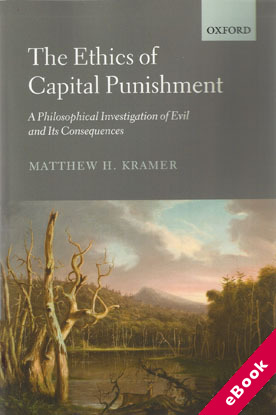
The device(s) you use to access the eBook content must be authorized with an Adobe ID before you download the product otherwise it will fail to register correctly.
For further information see https://www.wildy.com/ebook-formats
Once the order is confirmed an automated e-mail will be sent to you to allow you to download the eBook.
All eBooks are supplied firm sale and cannot be returned. If you believe there is a fault with your eBook then contact us on ebooks@wildy.com and we will help in resolving the issue. This does not affect your statutory rights.
Debate has long been waged over the morality of capital punishment, with standard arguments in its favour being marshalled against familiar arguments that oppose the practice.
In The Ethics of Capital Punishment Matthew Kramer takes a fresh look at the philosophical arguments on which the legitimacy of the death penalty stands or falls, and he develops a novel justification of that penalty for a limited range of cases. The book pursues both a project of critical debunking of the familiar rationales for capital punishment and a project of partial vindication.
The critical part presents some accessible and engaging critiques of major arguments that have been offered in support of the death penalty. These chapters, suitable for use in teaching courses on capital punishment, valuably take issue with positions at the heart of contemporary debates over the morality of such punishment. The book then presents an original justification for executing truly terrible criminals, a justification that is free-standing rather than an aspect or offshoot of a general theory of punishment.
Its purgative rationale, which has not heretofore been propounded in any current philosophical and practical debates over the death penalty, derives from a philosophical reconception of the nature of evil and the nature of defilement. As the book contributes to philosophical discussions of those phenomena, it also contributes importantly to general normative ethics with sustained reflections on the differences between consequentialist approaches to punishment and deontological approaches.
Above all, the volume contributes to the philosophy of criminal law with a fresh rationale for the use of the death penalty and with probing assessments of all the major theories of punishment that have been broached by jurists and philosophers for centuries. Although the book is a work of philosophy by a professional philosopher, it is readily accessible to readers who have not studied philosophy.
It will stir both philosophers and anyone engaged with the death penalty to reconsider whether the institution of capital punishment can be an appropriate response to extreme evil.